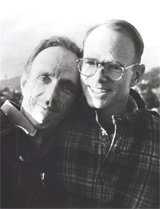BIOS: Life, Death, Politics; Campbell and Casarino on Tekhnē and Time-Images
Guest Writer: John Claborn
Sunday, May 2, 2010
posted under
Agamben
,
biopolitics
,
Bios
,
Campbell
,
Casarino
,
Cinema 2
,
Deleuze
,
foucault
,
Hay
,
Silverlake Life
by Unit for Criticism


Tom Joslin and Mark Massi, Silverlake Life
[On April 30 and May 1, 2010, the Unit for Criticism partnered with the Holocaust, Genocide and Memory Studies initiative for a a conference, BIOS: Life, Death, Politics. In the first of a series of guest blogs from the conference, John Claborn writes about the panel featuring papers by Timothy Campbell (Cornell) and Cesare Casarino (U Minnesota).]
Campbell and Casarino on Tekhnē and Time-Images
Written by John Claborn (English)
In his anecdotal preface to the first panel of the Unit for Criticism’s co-organized conference, Bios: Life, Death, Politics, James Hay introduced panelists Timothy Campbell and Cesare Casarino as “Italianists” engaged with Foucault’s College de France lectures of the late 1970s and early 1980s. The presentations by Campbell and Casarino complemented each other well, as each began with an explication of biopolitics (drawing heavily on theorists like Walter Benjamin, Michel Foucault, Giorgio Agamben, Antonio Negri, and Roberto Esposito) followed by an attempt to theorize potential openings for resistance to modern biopolitical regimes.
Campbell’s paper, “‘Enough of a self’: Thanatos and the Tekhnē of Bios,” first offered a reading of Foucault’s concern with tekhnē in his work on the "Hermeneutics of the Self" and its relation to “modern modes of being subjects.” Foucault, Campbell interprets, advanced a “tragic reading of bios,” in which self-care as a modern mode of subjectivation constricts and captivates bios. Since Greek antiquity, tekhnē has separated from bios and now approaches it no longer as an object but as something to be mastered or “tested” within a “regime of the care of self.” Campbell then proposed a notion of “attention” as a possible mode of resistance to this constrictive regime, seeing attentiveness as a withholding of judgment and negation (i.e. the opposite of “testing”) from the object. A tekhnē of attention “reaches out” to the object not in order to test it, but rather to engage it in “creative play.”
Casarino advanced a notion of the “life-image” based on his reading of Gille Deleuze’s Cinema 2: the Time-Image as a “history” of time’s radical transformation under post-World War II biopolitical production (and reproduction) and post-Fordist capitalism. He showed a clip from the 1993 AIDS documentary Silverlake Life to illustrate the emergence of the life-image out of the “time-image.”
The time-image consists of shots that “express” duration rather than movement (of the camera or of figures in the mise-en-scéne). The documentary shows sequences of “cinematic still-lifes” (devoid of human presence) and various “whatever spaces” that express the alienation of the AIDS victim—the “walking dead,” as the voiceover says—from everyday, biopoliticized life. For Casarino, the life-image is not a representation of life but an “expression” of “enduring” life through the quasi-religious experience of the cinema.
In the discussion afterwards, the audience raised a few questions for Campbell: What is lost by removing “modernity” from the title of the talk (included on the conference schedule, but removed for the actual talk)? What exactly does Foucault mean by “test”? Does this concept need further elaboration and stronger historical grounding?
Some questions I have: how might this notion of “attention” benefit from an engagement with cognitive psychology and neuroscience? And does “attention” as resistance risk a kind of pure formalism reminiscent of Heideggerian authenticity? What is its political, ethical, and historical content?
Some questions for Casarino were also raised: How does the specificity of the video (vs. cinematic) medium in Silverlake Life affect the argument about the life-image? Can the life-image be thought of as emerging out of the “creative play” (tying into Campbell’s talk) of the time-image? What is the relation of the life-image to bare life?
1 comments:
Dear John, many thanks for your perceptive (and of course attentive) reading of my paper. I had a couple of responses to offer with the hope that they might open up the discussion to others. First, it's true that cognitive psychology has focused increasingly on the relation of "working memory" and "selective attention," but honestly I'm not as familiar as I wish I was about these connections. I'd appreciate any further thoughts you might have along with suggestions for reading. In terms of grounding attention more strongly in history, you're absolutely right. Some of my more recent research concerns attention as an organizing principle in Koehler's reading of Gestalt as well as obviously in Merleau-Ponty but I'm at the beginning stages (Debord is going to figure prominently as well).
I was somewhat perplexed by the suggestion that I was promoting attention as a kind of pure formalism indebted to Heidegger's eigentilich since my intention was exactly the opposite. I was proposing attention (as opposed to judgment) as a way of avoiding the Agambenian division between proper and improper life, which rehearses in problematic ways Heidegger's division between proper and improper writing (eigentlich and uneigentlich) in /Parmenides/. My foray into Freud and the reality and pleasure egos as premised on a division between inner and outer was meant not only to show the implicit relation that bios and zoe have to ego preservation and defense but also to suggest a way forward out of a blocked dialectic between bios and zoe (one I should add in line with Esposito's thoughts on the impersonal). The problem as I see it concerns an assumed originary division between life. That's the beauty of Foucault's reading of a tekhne of bios -- it avoids the trap of an already doomed (and saved) form of life.
Thanks finally for trying to bring the Cesare's life image into conversation with play. I was struck too by how deeply the video clip drew out a relation between creative attention and play. I'd love to hear your thoughts.
Post a Comment